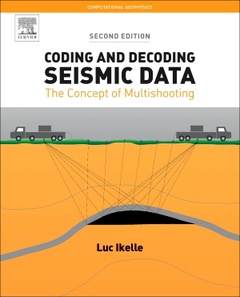Description
Coding and Decoding: Seismic Data (2nd Ed.)
The Concept of Multishooting
Computational Geophysics Series
Author: Ikelle Luc T.
Language: English
Subject for Coding and Decoding: Seismic Data:
Support: Print on demand
Description
/li>Contents
/li>Readership
/li>Biography
/li>Comment
/li>
Coding and Decoding Seismic Data: The Concept of Multishooting, Volume One, Second Edition, offers a thorough investigation of modern techniques for collecting, simulating, and processing multishooting data. Currently, the acquisition of seismic surveys is performed as a sequential operation in which shots are computed separately, one after the other. The cost of performing various shots simultaneously is almost identical to that of one shot; thus, the benefits of using the multishooting approach for computing seismic surveys are enormous.
By using this approach, the longstanding problem of simulating a three-dimensional seismic survey can be reduced to a matter of weeks. Providing both theoretical and practical explanations of the multishooting approach, including case histories, this book is an essential resource for exploration geophysicists and practicing seismologists.
1. Introduction to Multishooting: Challanges and Rewards2. Mathematics of Statistical Decoding: Linear Instantaneous Mixtures3. Mathematics of statistical decoding: Nonlinear Instantaneous Mixtures4. Mathematics of Statistical Decoding: Convolutive Mixtures5. The Decoding and Demultiple of Instantaneous Mixtures6. Decoding Methods for Underdetermined Convolutive Mixtures7. Imaging of Multishot Data8. Case Histories
Appendix A. Nonnegative matrix factorizationAppendix B. Nonnegative tensor factorizationAppendix C. A review of 3D finite-difference modelingAppendix D. Wave Propagation
Primary: Exploration geophysicists, seismologists studying earthquakes, volcanoes, and in the petroleum industry. Secondary: Environmental engineers, geologists, and geographers.
He is a founding member of Geoscientists Without Borders, for which he received an award from SEG in 2010. He is a member of the editorial board of the Journal of Seismic Exploration and has published 107 refereed publications in international journals.
- Investigates how to collect, stimulate, and process multishooting data
- Addresses the improvements in seismic characterization and resolution that can be expected from multishooting data
- Provides information for the oil and gas exploration and production business that will influence day-to-day surveying techniques
- Covers robust decoding methods of undetermined mixtures, nonlinear decoding, the use of constraints in decoding processes, and nonlinear imaging of undecoded data
- Includes access to a companion site with answers to questions posed in the book




